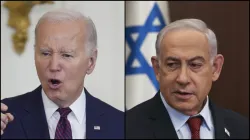Biden speaks to Netanyahu after long gap, says two-state solution 'not impossible' under Israeli PM
The two leaders spoke to each other after nearly a month and a day after Netanyahu rebuffed Biden's calls for Palestinian sovereignty after the war ends. However, Biden said the Israeli PM was not opposed to all two-state solutions, and there were a number of types possible.

Israel-Hamas war: US President Joe Biden on Friday spoke to Israeli Prime Minister Benjamin Netanyahu after a glaring, nearly four-week gap during which fundamental differences arose between the two close allies on how to proceed with military operations and the possible pathway to Palestinian statehood in postwar Gaza. After the meeting, Biden said that the two-state solution was not impossible while Netanyahu was in office.
After the Israel-Hamas war broke out following the militant group's attack on the Jewish country on October 7, the US and its allies have provided steadfast support to Netanyahu even in the face of global condemnation over the mounting death count of Palestinians - crossing 24,000 - and the humanitarian suffering in Gaza following Israel's fierce retaliation with airstrikes and ground operations.
However, the relationship between Biden and Netanyahu has shown signs of strain, such as when the US President appealed to the latter to tone down its offensive and opt for precision strikes against Hamas to limit civilian suffering. Recently, Netanyahu said he rebuffed Biden's calls for Palestinian statehood, which the US believes is the key to unlocking peace and calm in the decades-long conflict between Israel and Palestine.
Biden's conversation with Netanyahu comes a day after the Israeli Prime Minister said that he told US officials of his objections to an independent Palestinian state, saying that such a step would become a launching pad for attacks on Israel. During the call, Biden reaffirmed his commitment to work towards helping the Palestinians move towards statehood.
“As we're talking about post-conflict Gaza ... you can't do that without also talking about the aspirations of the Palestinian people and what that needs to look like for them,” said National Security Council spokesman John Kirby. Their 30 to 40-minute call on Friday was their first conversation since December 23.
'Two-state solution not impossible'
After the call, Biden said the creation of an independent state for Palestinians was not impossible while Netanyahu was still in office. The US president affirmed that Netanyahu was not opposed to all two-state solutions, and there were a number of types possible, the Guardian reported. “I think we’ll be able to work something out ... I think there’s ways in which this could work,” he said.
The two leaders discussed efforts to secure the remaining hostages held by Hamas, and Israel’s shift to more “targeted” operations in Gaza to allow more humanitarian assistance to come through, the White House said. Biden has been pressuring Israel to reduce Palestinian deaths even as he has maintained his strong support of Israel in its war against Hamas.
“The president also discussed his vision for a more durable peace and security for Israel fully integrated within the region and a two-state solution with Israel’s security guaranteed,” the White House said in a statement about their call. Biden’s call came as Red Crescent officials reported “intense gunfire from the Israeli drones targeting citizens at al-Amal hospital” in Khan Younis in southern Gaza.
The Gaza health ministry said 142 Palestinians had been killed and 278 injured in Gaza over the past 24 hours, raising the death toll from more than three months of war to 24,762. Meanwhile, US Senators earlier this week blocked a measure that would have made US military aid conditional on an investigation into whether the Israeli government is violating human rights and international accords in Gaza, signalling growing unease in Washington over the Israeli bombardment.
Rift between Biden and Netanyahu
Biden, a center-left Democrat, and Netanyahu, who leads the most conservative government in Israel's history, have had a challenging relationship over three decades. The latest rift emerged as the US and Israel faced international isolation while several countries repeatedly urged for an immediate ceasefire in the wake of widespread devastation and the rising death count of Palestinians.
There is also growing impatience with Netanyahu in Israel over the lack of progress in freeing dozens of hostages still held by Islamic militants in Gaza. Biden's frustration with Netanyahu has grown more evident as he pointed fingers towards members of Netanyahu's right-wing coalition government who have made contentious remarks regarding the future of Palestinians.
Biden also faces American voters in November, in a likely rematch with former President Donald Trump. Netanyahu and Trump forged a close relationship during the Republican's term in office. Biden faces criticism from some on his left who believe he hasn't pushed the Israelis hard enough to demonstrate restraint as it carries out military operations.
Biden has proposed that a “revitalised” Palestinian Authority (PA), which is based in the West Bank and led by Mahmoud Abbas, could run Gaza once the war ends. Netanyahu has roundly rejected the idea of putting the Palestinian Authority, which is beset by corruption, in charge of the territory. So Israel “must have security control over the entire territory west of the Jordan River,” he said. “That collides with the idea of sovereignty. What can we do?”
White House officials have sought to play down Netanyahu's rejection of Biden's call for a two-state solution, noting that his rhetoric is not new. They hold out hope Israel could eventually come around to accepting a Palestinian state that comes with strong security guarantees for Israel. Meanwhile, a member of Israel’s War Cabinet cast doubt on the country’s strategy for releasing hostages held by Hamas, saying only a cease-fire can free them, as the prime minister rejected the United States’ calls to scale back its offensive.
(with inputs from agencies)
ALSO READ | Israeli PM Netanyahu rejects US push for Palestinian statehood in postwar scenario